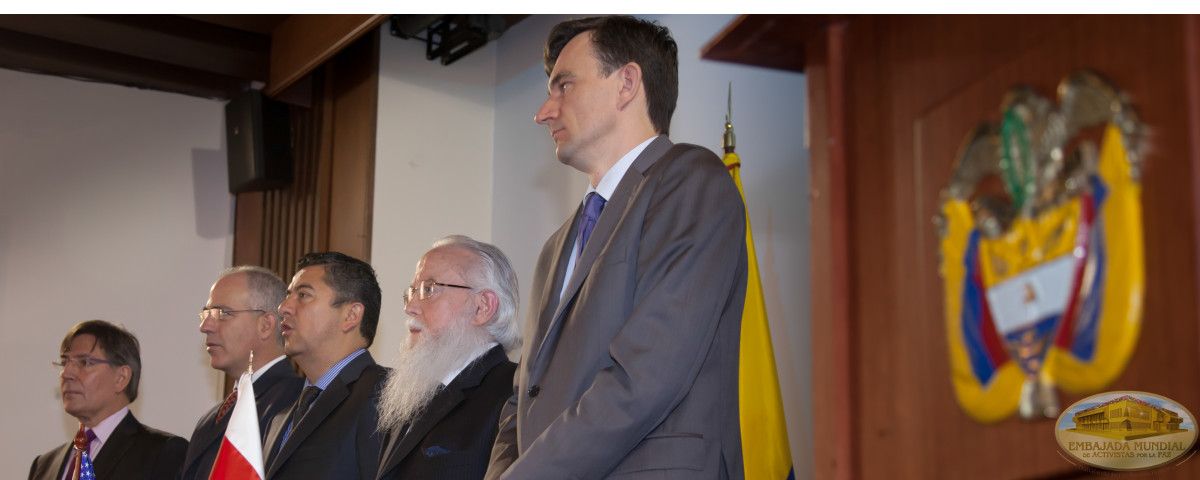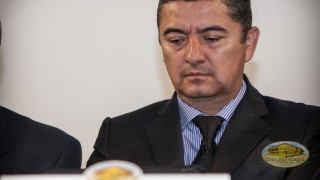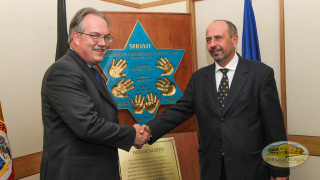The Senate of Colombia Hosts Forum “Tolerance and Respect: the Requirements to Achieve Peace"
In conjunction with the Congress of Colombia, the campaign "Traces to Remember" created the forum "Tolerance and Respect: the Requirements to Achieve Peace", in an effort to create discussions about the Holocaust and its consequences, mainly with government institutions of different countries.
Over 300 people gathered at the Luis Guillermo Velez Auditorium to welcome the ambassadors of Israel, Poland and France, as well as representatives of the embassies of Germany and Russia, diplomats of the Colombian government such as Dr. Eduardo Verano de la Rosa, Jewish community leaders, Holocaust survivors, and peace activists from different parts of the country.
Edgar Espindola Niño, Second Vice President of the Senate, described the forum as a transcendent event "with the objective that Colombians and the entire world become aware that, from here, we are working to consolidate and help develop a policy of respect for human rights."
"The honorable legislators of Colombia are being loyal to their obligation to make just laws that seek peace, harmony, well-being and prosperity for their citizens"
stated Dr. William Soto, Global Ambassador of the Global Embassy of Activists for Peace, praising the achievement of the Colombian legislation for passing the Anti-Discrimination Law in 2011, known as Law 1482. This law prohibits discriminatory acts and the spreading of ideas and doctrines that stem from racism and xenophobia, establishing such as crimes.
In addition, he proposed that Congress pass another law to include the Holocaust as a subject of analysis, a course of study or a case study across the school system. "May we transform the darkest chapter, the dark stain on the page of humanity’s existence, into the most powerful mechanism of reflection and the protection of the value of rights, life and human dignity" he expressed.
A Historic Debt:
Yoed Magen, Israel’s Ambassador to Colombia, urged the audience to be mindful of xenophobic statements, and praised the work of the Colombian Legislation and summoned the authorities to include the subject of the Holocaust in the country’s schools "so that new generations are aware of the devastating consequences that intolerance can lead to, and so that the Holocaust and its lessons are never forgotten."
Maciej Zietara, Ambassador of Poland to Colombia, recounted Poland’s relationship with the Jewish community throughout different historical circumstances, and their invaluable human and intellectual input. He also emphasized the importance of the survivors’ testimonies, quoting poet Zbigniew Herbert. He concluded by saying: "There should be no acceptance of those trying to revive anti-Semitic and xenophobic language, and those who degrade others instead of seeing themselves in others. That is our commitment."
Pierre-Jean Vandoorne, Ambassador of France, spoke about the Élysée Treaty of 1963, World War I, and the creation of the Matteoli Commision by President Jacques Chirac, who was the first president to acknowledge France’s responsibility and request reparations for the victims of anti-Semitic policies established by the Vichy Government. He added: "It is good and right that we continue to gather, in order to remind ourselves, to meditate, to pray and to tremble when we see the history that preceded us."
Gunnar Schneider, Chief of the Cooperation Office of the German Embassy in Colombia, spoke about Germany’s actions and the importance to recognize its participation in the Holocaust as the perpetrator country, but also exercise appropriate actions that contribute to the mending, to the honoring, like the stolpersteine, or stumbling stones and their meaning. "In our daily lives, there must be a memory of what happened," Schneider stated, "but also knowing the terrible event that took place, we have the hope that when someone attempts to commit similar crimes, we will say ‘no’. We will have this experience and we will be able to say that this is something we don’t want to happen ever again."
Voices of the Holocaust:
Argentine author, psychologist, conference speaker and daughter of Holocaust survivors, Dr. Diana Wang, gave the exposition "Why teach about the Shoah?" She presented this analysis of the Holocaust based on Hitler’s racial theory, and the Holocaust as a unique annihilation in history which set a precedent and established a new standard for humanity. Dr. Wang emphasized that teaching the history of the Shoah should also be tied to teaching about World War II and the formation of values.
Holocaust survivor Sigmud Halstuch shared with the audience with a touching testimony, clinging to life even after his mother tried to commit suicide and he didn’t let her.
"It is very difficult to say all of this... to lose a brother in a concentration camp, dad was buried alive in a mass grave, my grandmother and aunt who were taken on the train of death... but I cannot complain..."
he expressed.
Rabbi Yehoshua Rosenfeld, Director of Casa Lubavitch, paid tribute to Mr. Jacobo Brod, a Holocaust survivor who died at 100 years old, leaving behind his lesson to love life. Rabbi Rosenfeld dedicated Psalm 150 to Mr. Brod, and concluded by saying: "In his honor, I would like to conclude by thanking Colombia for opening its doors to so many of our ancestors who loved life and shared so much kindness and so much life with these special people."


